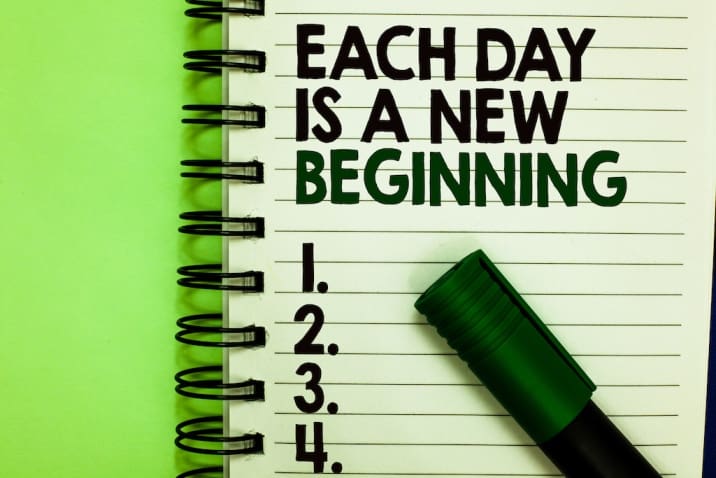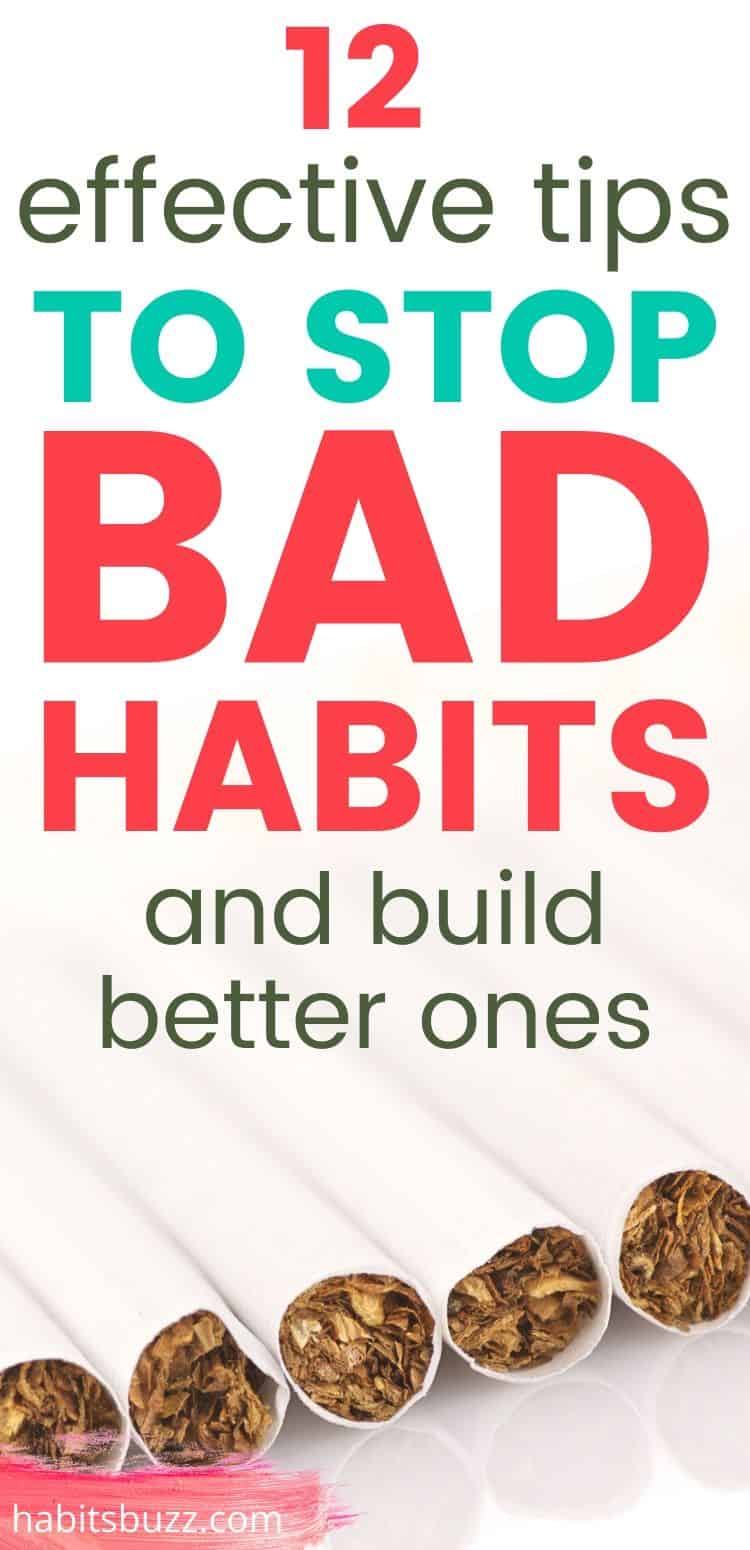How to break bad habits (12 effective tips)
Habits are fascinating.
They save us from a lot of hard work because our brains don’t have to learn our routines from scratch every single day. Habits save time and energy and help our brains to work efficiently.
But habits become a problem when they don’t serve us in a good way. We might have started some of the bad habits intentionally or just out of curiosity. But there comes a point when we want to break free from those bad habits because of the harm they cause.
In order to break a bad habit, or even to create new good habits, we need to know the basics behind habit formation.
**This post contains affiliate links. I may receive a small commission at no extra cost to you if you make a purchase through my affiliate link**
How are habits formed?
James Clear, in his book, Atomic Habits talk about the different steps behind habit formation.
Habits are formed in four simple steps: cue, craving, response, and reward.
Whenever we do a habit, we go through all these four steps. Cues trigger our brain to start a behavior. What we want from a habit is a reward.
So if you want to break the bad habit of nail-biting, if you observe the behavior, it occurs when you are stressed, bored, or hungry. And that’s the cue.
And the reward could be reduced stress and the small dopamine boost you get from trimmed nails.
This has happened enough times now so the next time your brain identifies any of the cues, it automatically triggers you to respond by biting nails.
So, if you want to break a bad habit, you have to understand the cues and the associated cravings that cause you to do the habit. And work on creating barriers and make them difficult so that it is hard to repeat the habits.
Why is it hard to break bad habits?
Even though we label these habits “bad”, we get something beneficial out of them. Hence it is hard for us to break free from them. And also, there are many other reasons why it’s hard to get rid of bad habits.
For example,
- You light a cigarette when you feel anxious, and as a result, you get stress relief
- You reach for desserts every day after lunch because you know it tastes good and you crave the comfort again and again.
- You reach for a drink when you are feeling down because it helps you to numb the reality at least for some time.
These are some benefits you have experienced when you did these habits. So, you don’t want to let go of them.
Another reason could be your beliefs about the habit. If you believe it will be tough to break the habit and that you won’t be able to identify yourselves without the habit, you again don’t want to let go of it. If you believe it’s not fun to celebrate an achievement without alcohol, it becomes another subconscious block that prevents you from stopping the habit.
If you have tried many times to stop a bad habit, but you have failed repeatedly, your beliefs about your ability to break the habit gets affected.
And also, your motivation levels vary on different days and during different seasons of life. It’s easier to fall back into the old patterns when you are going through difficult times.

As evident, there are many factors coming into play in making the bad habits difficult to stop.
So if you want to break bad habits, you need to have some planning and systems in place to deal with the cues as well as cravings.
I would like to say there is no one big idea, but rather a list of small ideas and when you put them into practice, they start working. You don’t have to do anything huge to change your life but start from making small consistent changes.
So let’s get into it.
11 TIPS TO STOP BAD HABITS
1. UNDERSTAND YOUR TRIGGERS
The first step in breaking bad habits is understanding what causes them. And what you get out of them.
Is it pleasure, stress relief, or is it a coping strategy?
You can take your journal (maybe you could keep one specifically to record your journey of getting rid of this habit). And write down the list of all the negative side effects of your bad habit.
Writing is powerful. When you see it on paper, your brain sees something solid to work with.
Now write down all the positive side effects of this habit. These positive effects are the ones that are keeping you from stopping the habit. Your brain craves for the rewards even when you know this habit is not entirely good.
Related: How are habits formed in the brain?
2. MAP OUT YOUR WHY
Now that you have the bad effects of your habit listed, these should act as your why. This list should be your north star.
For many people, the thought of untimely death and causing misery to family, helped them quit smoking. For some people, the motivation comes after seeing friends or family suffering from lung cancer which was caused by smoking.
You need to adjust your mindset from a victim to a warrior. So many people justify their bad behaviors by saying it happened because of others’ influence. It could be true. But ultimately, you are the one who makes the choices and goes through the actions.
Taking responsibility and believing in your power to change your destiny is important to make any lasting change in life.
So, whether you smoke the next puff or not, whether you eat icecream again after lunch or not, all of them are in your power.
Most of the time, we know the side effects of our bad habits but we still continue doing them because the side effects are not felt in one day or month.
But we can take a look into the future through some journaling exercises. I would like you to take out your journal and answer these questions.
- What are the side effects of this habit?
- How would my life look like in one, two, and five years if I don’t change anything about it?
- How would this habit affect my overall well-being and success in life?
- What would that mean to me? Will I be happy with the result?
- What new habit will help me to reach my goals? How will it change my life?
- How can I install a new habit in my life? What changes can I make?
These questions may look silly. But trust me, I do a lot of journaling work as part of my personal growth and it always helps more than I imagine. When I start writing, tons of ideas come flowing and sometimes I get powerful intuitive nudges that push me to make life-changing decisions.
Over the years, these journaling exercises have helped me make the right decisions and consistently improve my habits.
You might think “I know the answers, they are in my head”. But you get more clarity when you write.

3. RECORD EVERYTHING
Before setting out to eliminate bad habits, you must know the frequency and the causes of bad habits.
So keep a journal exclusively to track and record your progress. We need to identify the cues. And the times of the day they are happening the most.
For example, I wanted to stop my bad habit of staying up late as it was badly affecting my productivity in the morning. So I started making a record of the cues and the reasons why I was doing it.
One of the reasons was the use of cell phone in bed and the other was I wanted to enjoy the alone time I get after kids went to bed. As an introvert, I enjoyed that peaceful time so much that I didn’t want it to end.
So I kept prolonging my bedtime as much as possible.
But the side effect is that my bedtime was not regular and you know what happens when we use social media before bed. Sometimes, I would get sucked into watching videos, and then my mornings would be ruined.
I always got up feeling guilty. So I had to find better alternatives to get my alone time.
Which I am going to talk about next.
4. FIND BETTER HABITS THAT PROVIDE THE SAME RESULT
Once you identify the rewards, think about alternate habits that can provide you with a similar result.
- If you drink alcohol to ease your worries and escape reality, find out how you can strengthen yourself to develop better coping skills. You can resort to mindfulness meditation to gain control over your emotions and practice releasing, and feeling your emotions. Find ways to develop more resilience.
- To curb your nail-biting habit, find out the alternate ways to release stress, like taking deep breaths or practicing mindfulness.
- Instead of staying up late and lose track of time, make extra quiet time for yourself by waking up early
- Instead of relying on coffee for energy, drink energizing smoothie in the morning.
There can be so many alternatives to our current bad habits. You just have to understand your reasons behind holding onto them.
And when you switch to alternate good habits and be consistent with them, it naturally spreads onto other areas of your life. Such habits are called keystone habits.
- When you start exercising, you naturally want to develop better eating habits and feel love more love towards your body. It could also lead to stopping bad habits like smoking and drugs.
- When you start reading more, you want to spend less time on your screen devices
- When you start setting goals and plan your day, you put an end to procrastination

5. IDENTITY-BASED HABITS
I love this concept by James Clear. He says, to build lasting habits, you need to build an identity that supports those habits.
We all have certain beliefs about ourselves and habits are often a reflection of those beliefs. For example, if you keep saying to yourself, “I hate exercise, I am too lazy to move”, you are creating your identity as a person who hates exercise there.
It’s hard to build an exercise habit from such a belief because you then can’t get yourself to exercise as often as you would like.
According to James Clear, rather than focusing on creating outcome-based goals, create identity-based goals.
- Instead of saying “I want to lose 10 pounds”, focus on becoming a person who exercises at least 5 times a week.
- Instead of saying “I am trying to quit smoking”, say “I don’t smoke”. There is an immediate shift in thinking here.
- Instead of thinking “I should read more books”, become a person who reads 10 pages a day.
When you focus on becoming the person who does the habit consistently rather than focusing on the outcome, you automatically will achieve your goals.
If you were successful in not checking your phone after 9 pm yesterday, you know you can do it again. And that’s how you build belief in your new identity. You prove to yourself through small wins day after day that you are this person who doesn’t stay up late checking social media.
6. MAKE IT DIFFICULT
When you want to build new good habits, you create an environment where it’s favorable to stick with them. Similarly, when you want to stop bad habits, you again have to make the environment favorable to “not do” the habit.
For example, it’s hard to stop reaching for the fried chips when hungry if you buy packets of chips every time you go to the grocery and stock them at home. So to make it difficult, stop buying chips and instead prepare healthy snacks or keep fresh fruits in places where it’s easy to grab. As a result, you become a person who eats more fruits.
Another example:
If you tend to watch Netflix on mobile and stay up late as a result, leave the phone in another room before going to bed. Or use apps, that are used to lock “the problematic apps” so that these apps are locked at a specific time every day. I use the Android app called “Lock Me Out” to keep all the social media apps locked from 9.30 pm to 10.30 am the next day. It’s my idea of making it difficult.
So the takeaway is, you find out the cues that cause you to do the habit and try to hide them from your thoughts and vision as best as you can.

7. HANG OUT WITH PEOPLE WHO HAVE THE DESIRED BEHAVIOR
Have you noticed how you yawn when you see someone yawning? Do you cry when you see a sad scene from a movie? Do you feel happy when you are talking to a happy and energetic person?
Mirror neurons are at work here.
According to Psychology Today,
Our brains are made up of many neurons and cells, but it’s a special group of cells called a mirror neuron that is responsible for this phenomena. These cells allow us to learn through imitation so that we respond not only to our own internal states or environmental stimuli but to actions, movements and emotional states of other people.
These neurons not only help us to learn through imitation but also to connect with other people’s emotions and feel them as they are our own.
Mirror neurons are a recent discovery and there is a lot to learn about it. But it won’t be surprising if it plays a role in getting people to start bad habits through the influence of people around them.
So, when you want to quit bad habits, it is important to create a favorable environment and stay away from people who make this habit trigger for you.
That doesn’t mean you should ditch all your good friends, but if they are in some way forcing you to do it, why not consider finding people who can motivate you to live a better life?
It is said that you are the average of the five people you surround yourself with. If you want to know your future, look around and see who you are spending the most time with. They are definitely influencing your habits.
8. YOU ARE NOT YOUR BAD HABITS
Many people have a hard time imagining themselves without their bad habits. So they say, “This is who I am, I cannot change this”. But I doubt it.
Were you born an alcoholic? Or did you start eating junk food in the first year of your life?
Over time our habits become so much ingrained in our identity that we are not able to view us a person without those habits. Especially if you are using these bad habits as a coping strategy, you don’t know what you would do when you become sad. You don’t know how you would celebrate a victory without alcohol.
Life can look very different and you cannot identify it as yours without this habit.
And this is why creating identity-based habits is important. Instead of saying, “I am a smoker” or “I am a porn addict”, prove to your brain that “I am a non-smoker” or “I hate porn”. How?
First shifting your beliefs around it by repeating positive affirmations.
“I find healthy ways to enjoy my victories”
“I find ways to enjoy life in healthy ways”
“I have full control over my choices”
Affirmations are powerful. When you choose to write or speak affirmations daily, your brain starts to believe them and you start to act from the new beliefs.
Or else how would you stop drinking if you think there is no enjoyment in life without alcohol? It’s not possible.
Start separating yourself from the behavior and also think about how you had a perfect life before these addictions too. You just need to fill in your days with healthier habits.
Related:
- 10 best habits to take your life to the next level
- 10 super healthy habits to improve your health
- How to start a healthy lifestyle

9. ENLIST THE SUPPORT OF FRIENDS AND FAMILY
When stopping bad habits, you would need to go through difficult phases as your brain rewires the old neural pathways.
You will go through various withdrawal symptoms which can include anger and mood swings. So let your family and other people know so they can be supportive of you at this stage.
Pain is part of the process, but if you have your why and have the vision for your future in mind, it would help to motivate you. And that’s also one reason you want to spend time with people who don’t have the same bad habits as you.
You have the image of who you want to be in your mind and that acts as an accountability factor.
10. BE READY FOR SLIP-UPS
I am not saying you should wait for slip-ups, but you should keep it in the back of your mind that if it happens you must quickly bounce back from it.
Don’t beat yourself up thinking you are a failure even if it happens more times than desired.
Many people who eventually quit bad habits reach that point after failing many times. So give yourself grace and accept the fact that you are human.
You always have a fresh day.
And if you are committed, you accept slip-ups and start again the next day.

11. Remind yourself how far you came
If you were successful in not doing the bad habit for four days but then on the fifth day, if you gave in, remind yourself about what you could achieve in the first four days.
Our brains have the tendency to look for what we didn’t do rather than on what we did accomplish. So since you know that now, take pride in the days you were successful in your goal. And that proves you can do it again.
12. 66-day habit tracker
How long does it take to form a new habit?
According to the study from the University College of London, it takes an average of 66 days for a new habit to become automatic.
It all depends on the person, his circumstances, and other factors. But studies show that it takes anywhere from 18 to 254 days to form a new habit.
What I do is, I create 66-day trackers in my bullet journal when I want to form a new habit. When we are breaking bad habits, we are essentially forming a new habit of not doing the old habit.
And I use this tracker to track my progress. It helps to keep me motivated and hold me accountable. Earlier I used to stop tracking midway when I slipped to old ways. Because I would get uninspired when I failed at it.
But these days, I accept it as part of the process and not worry about the blank days in between. But be careful about not getting back on track as soon as possible.
Related: 25 gorgeous bullet journal trackers to help you build better habits
FINAL THOUGHTS
Have you noticed how there is a small window of time – may be a second – that decides what action you take? There is a second when you decide to switch off the alarm and go back to sleep again.
There is a second when you decide to give in to your desire to light up a cigarette. There is a second when you decide to check Youtube at 11 o’clock in the night even though you know minutes can turn into hours.
If you can beat the craving for some time there, you will gain victory over your bad habit one more time. The urge to do the habit can come in waves even long after you quit the habit, as our brains do not completely forget the habit. But accept the fact that when the cue or craving comes again, it is not a signal to do it. But simply acknowledge that it’s there and let it pass. And as it happens, again and again, you break free from the habit.
More reading:
- 18 signs you are addicted to your smartphone
- 8 reasons you don’t stick with new habits (and how to stick with them)
- A simple technique to stay motivated when starting a new habit
Like this post? Please take a moment to PIN and SHARE!








